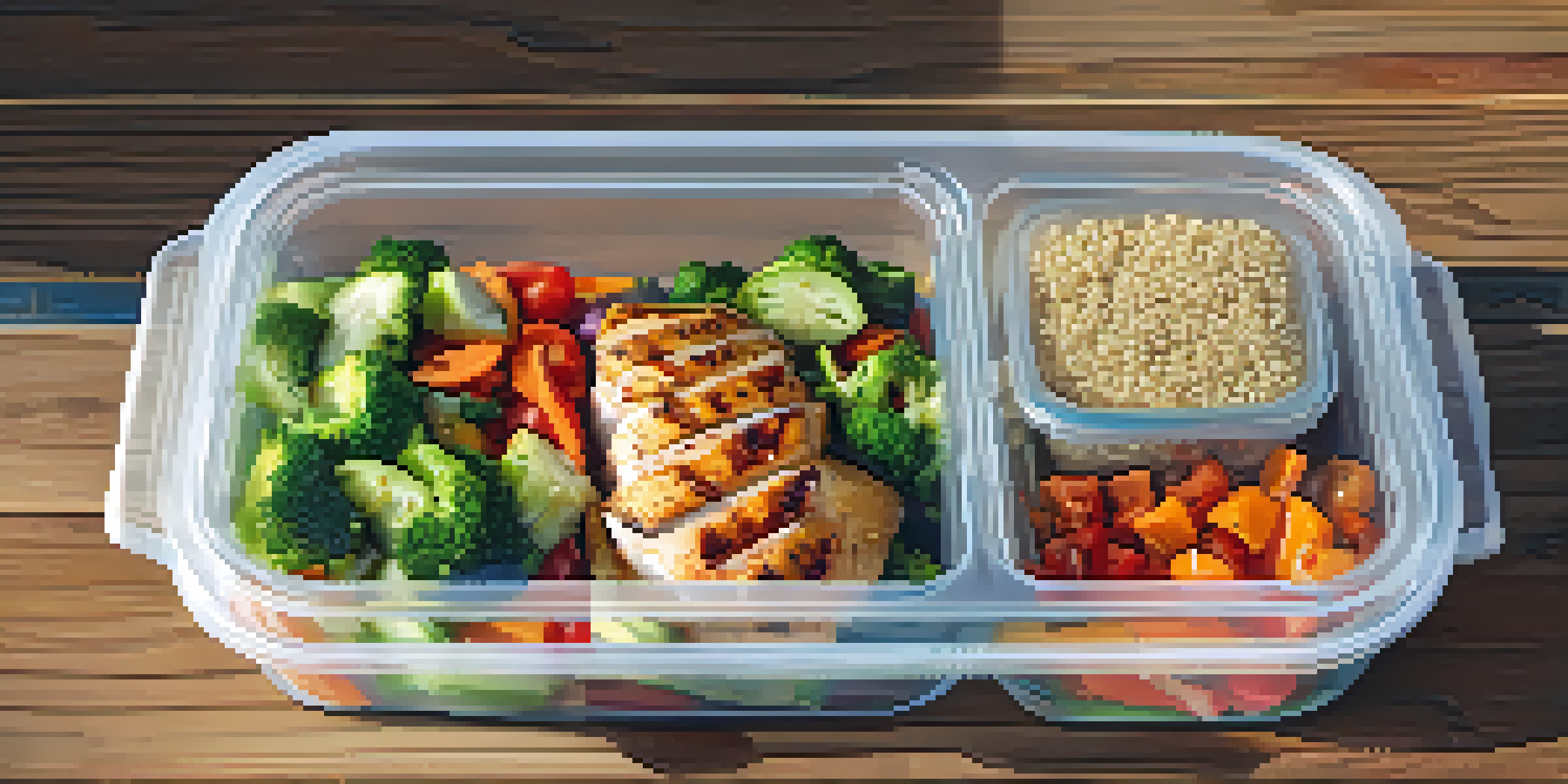Nutrition Tracking: Fueling Your Bodybuilding Progress

Understanding Nutrition Tracking in Bodybuilding
Nutrition tracking is the process of monitoring your food intake to ensure you're meeting your dietary goals. For bodybuilders, this means paying close attention to macronutrients—carbohydrates, proteins, and fats—that fuel muscle growth and recovery. It’s not just about counting calories; it’s about understanding how different foods impact your performance and physique.
You are what you eat, so don’t be fast, cheap, easy, or fake.
By keeping track of what you eat, you can identify patterns in your nutrition that either support or hinder your bodybuilding efforts. For example, if you notice that your energy levels drop during workouts, you might need to adjust your carbohydrate intake. Ultimately, nutrition tracking helps you make informed choices that align with your fitness aspirations.
Many apps and tools are available to simplify this process, making it easier than ever to log meals and analyze your nutritional intake. Embracing these resources can lead to significant improvements in your strength training and overall results.
The Importance of Macronutrients for Bodybuilders
Macronutrients are the building blocks of your diet and play a crucial role in bodybuilding. Proteins are essential for muscle repair and growth, while carbohydrates provide the energy needed to power through intense workouts. Fats, often overlooked, support hormone production and overall health, making them an important part of your nutrition plan.

Each macronutrient serves a unique purpose; for instance, consuming high-quality protein post-workout can help kickstart recovery. Carbohydrates, especially complex ones, can fuel your sessions and replenish glycogen stores. By understanding the role of each macronutrient, you can tailor your meals to optimally support your body and training routine.
Nutrition Tracking Enhances Performance
Monitoring your food intake helps identify patterns that support your bodybuilding efforts and improve workout performance.
Finding the right balance of these macronutrients is key. Many bodybuilders follow specific ratios or guidelines based on their goals, which can vary from bulking to cutting phases. This approach ensures that you’re not just eating enough but also eating the right kinds of foods to sustain your progress.
Setting Up Your Nutrition Tracking System
To effectively track your nutrition, the first step is to establish a system that works for you. This might involve using a nutrition tracking app, a simple spreadsheet, or even a notebook. Whatever method you choose, consistency is key; regularly logging your meals will help you stay accountable and make adjustments as needed.
Nutrition is not just about eating, it’s about learning to live.
Start by recording everything you eat and drink throughout the day, paying attention to portion sizes. Analyzing this data can reveal insights into your eating habits, such as whether you’re skipping meals or overindulging in snacks. This self-awareness can empower you to make healthier choices and stay on track with your bodybuilding goals.
Don’t forget to include your workouts in your tracking system. By combining your nutrition data with your training regimen, you’ll get a clearer picture of how your diet impacts your performance and recovery, allowing you to make more informed decisions moving forward.
How to Calculate Your Daily Caloric Needs
Calculating your daily caloric needs is a fundamental aspect of nutrition tracking. It starts with determining your Basal Metabolic Rate (BMR), which indicates how many calories your body needs at rest to maintain basic functions. From there, you can factor in your activity level to find your Total Daily Energy Expenditure (TDEE), which is crucial for bodybuilding.
For those looking to build muscle, a caloric surplus is often necessary, meaning you need to consume more calories than you burn. Conversely, if your goal is to lose fat while preserving muscle, understanding your TDEE can help you create a caloric deficit. This balancing act is essential for achieving your desired physique.
Macronutrients Fuel Bodybuilding Success
Understanding the roles of proteins, carbohydrates, and fats allows bodybuilders to tailor their diets for optimal muscle growth and recovery.
Online calculators can assist in estimating your caloric needs, but remember that these numbers are just starting points. Regularly reassessing your intake and progress will ensure that you’re on the right path and making adjustments when necessary.
Identifying and Tracking Micronutrients
While macronutrients often steal the spotlight in bodybuilding nutrition, micronutrients are equally important. Vitamins and minerals support various bodily functions, including muscle contraction and recovery. A well-rounded diet rich in fruits, vegetables, and whole foods will help ensure you’re getting these essential nutrients.
Tracking micronutrients might seem daunting, but many nutrition tracking apps provide insights into your vitamin and mineral intake. By paying attention to these components, you can avoid deficiencies that could hinder your performance or overall health. For example, adequate calcium and vitamin D are vital for bone health, especially when lifting heavy weights.
Incorporating a variety of colorful foods into your meals can help you meet your micronutrient needs. Aim for a diverse plate to not only enhance your nutrition but also keep your meals exciting and enjoyable.
The Role of Meal Planning in Nutrition Tracking
Meal planning is a powerful tool that complements nutrition tracking. By planning your meals in advance, you can make intentional food choices that align with your bodybuilding goals. This helps prevent last-minute decisions that could lead to unhealthy eating habits or missed nutritional targets.
When meal planning, consider your weekly schedule and any training sessions you have planned. Preparing meals in bulk can save time and ensure you have healthy options readily available. For instance, cooking a large batch of chicken and quinoa can provide you with nutritious meals throughout the week.
Adjust Nutrition Based on Progress
Regular evaluation of your dietary intake and body response enables you to make necessary adjustments for continued success in your bodybuilding journey.
Incorporating variety into your meal plan can also keep you engaged and motivated. Experiment with new recipes or different cooking methods to make healthy eating an enjoyable part of your bodybuilding journey.
Adjusting Your Nutrition Based on Progress
One of the most important aspects of nutrition tracking is the ability to adjust your diet based on your progress. Regularly evaluating how your body is responding to your nutrition can help you identify what’s working and what isn’t. For example, if you’re not seeing muscle gains, it might be time to increase your protein intake or caloric surplus.
Listening to your body is crucial; fatigue, hunger levels, and recovery times can all provide clues about your nutritional needs. If you find yourself feeling sluggish or not recovering well, it may indicate a need for more nutrient-dense foods or adjustments in your meal timing.

Ultimately, nutrition tracking is an evolving process. As your training and body change, your diet should adapt as well, ensuring that you continue to fuel your bodybuilding journey effectively.